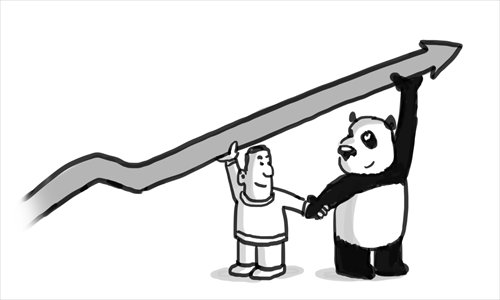Changing Myanmar tests China’s diplomacy

Illustration: Liu Rui/GT
In 2014, the democratic transformation promoted by the Myanmar government led by President U Thein Sein has neither sketched a democratic road map as the US and the EU expected, nor shaped a political realm controlled by a certain vested interests group. Instead it has taken the form of a peculiar "democracy with Myanmese characteristics." Myanmar also successfully hosted the 25th ASEAN Summit and the ninth East Asia Summit in November, demonstrating that it is moving toward a normal state and benefiting from its multilateral diplomatic strategy.
China and Myanmar have maintained close political exchanges over 2014. Many senior leaders of Myanmar, including President Thein Sein, visited China, and Chinese Premier Li Keqiang and Vice President Li Yuanchao traveled to Myanmar.
Besides, in May, the National League for Democracy dispatched a senior-level delegation to pay a visit to four cities in China, signaling Beijing's more proactive and pragmatic foreign policy toward different parties of Myanmar.
In addition, Myanmar opposition leader Aung San Suu Kyi holds a practical attitude toward the presence of Chinese firms in the country. Suu Kyi has expressed an interest in visiting China many times.
But the economic cooperation between China and Myanmar suffers from various difficulties, notably a structural imbalance despite increased trade volume.
Myanmar mainly exports primary resources like timber, natural gas, mineral products and jade to China while imports manufactured goods. Therefore there are concerns in Myanmar that the influx of Chinese products will deal a heavy blow to its already fragile national industry.
Chinese enterprises in recent years have witnessed a decline in investment due to fierce political struggle in the country. There was a recent clash between local protesters and riot police in the Chinese-backed Letpadaung copper mine project, killing one and wounding several including two Chinese workers. The reason why Chinese companies are encountering setbacks in Myanmar is complex, and it's unfair to solely blame the Chinese enterprises. Populism, labor and land dispute, central-local relationship and a series of other problems in Myanmar have been perplexing all foreign investors.
After all, the rules of the game have changed. Before its democratic transformation, Myanmar had to rely on China amid the severe economic embargo imposed by the West. But now, Western states are more engaged in reaching out to Myanmar, which is consequently seeking to maximize its own interests. Chinese enterprises are used to dealing more with Myanmese authorities instead of its private firms and nongovernmental institutions and thus urgently need to learn the real needs and desires of the locals.
China-Myanmar relations may confront more challenges before the latter's general election in 2015. But the Myanmese government and people will likely change their attitude toward China.
Suu Kyi has expressed on many occasions her goodwill toward China and Myanmese public opinion has also become more sober toward the Asian powerhouse.
At present, China-Myanmar ties are transforming from an abnormal state to normalcy. Myanmar's democratic transformation is conducive to China's diplomacy and in particular its peripheral diplomacy.
Beijing should spare no effort to address major issues in its relations with Nay Pyi Taw in the upcoming year. In the first place, we should use sincere and inclusive diplomacy to change China's image in the mind of the Myanmese people.
To this end, we should enhance our exchanges with the country's government, parliament, military, opposition parties, nongovernmental organizations, media and student groups to promote their understanding of China.
Chinese corporations should improve their image so that their Myanmese counterparts can feel the benefits brought about by Chinese investment and assistance.
Plus, China also needs to help Myanmar in properly tackling the issue of ethnic armed groups. A democratic, peaceful, unified, open and developed Myanmar is in favor of China's interests while a backward, split, closed, autocratic and corrupt Myanmar is not helpful.
Therefore, the Chinese government should further prompt the Myanmese government and the ethnic armed groups to negotiate and ink a long-term peace agreement, in a bid to realize prolonged peace and order in the border area between two countries.
The author is a professor at the School of International Studies at Yunnan University. opinion@globaltimes.com.cn